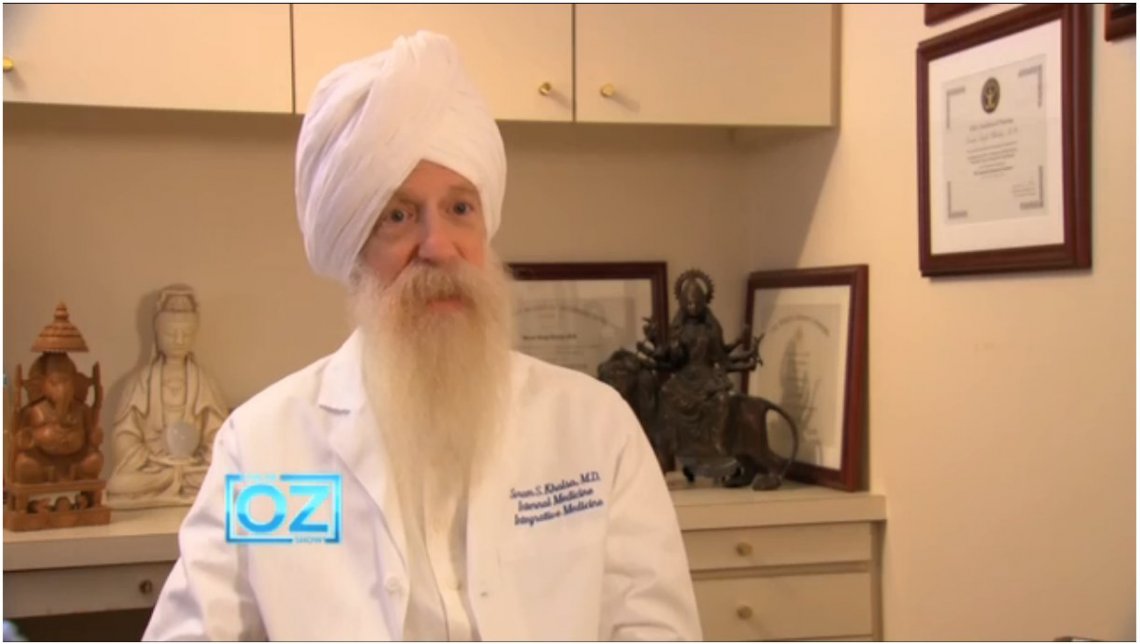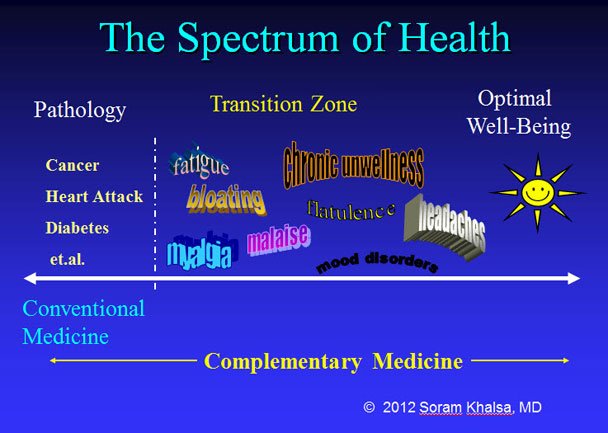Dr. Soram Khalsa believes that traditional medicine is failing you! He's devoted his entire career to integrating the best of traditional and alternative medicine to help you feel better. Could his methods could be the secret to wellness? View Part 2 of Dr. Soram Khalsa's Wants to Revolutionize Your Health. |
| An Integrative Medicine Guide to Better Health By Soram Khalsa, MD |
 |
|
Integrative medicine is the future of health care in our country. Doctors who specialize in integrative medicine study conventional medicine and realize its benefits. But they go on to study natural modalities of therapy including herbs, diet, acupuncture and homeopathy as a complement and supplement to traditional medicine. Because they combine the best of both of these approaches, they are called integrative doctors. Doctors who practice this way realize that health is on a “Spectrum.” At one end, we have optimal well-being. At the other end, we have chronic disease, including cancer, heart disease and diabetes that we see so much in our society. What they have not told us in conventional medical school is that there is a "gray zone" in the middle where organs are not sick or diseased yet. In the gray zone, organs get weakened, rundown, stressed, or toxic, and we realize that they are “dysfunctioning” but not yet diseased.
When organs dysfunction, we get a whole host of symptoms that doctors see so often in their practice. Without the integrative model, these health problems can only be treated symptomatically. Some examples of these problems are digestive problems like gas and bloating, migraines and other headaches, neck aches and backaches, and menstrual problems, including premenstrual syndrome. All of these conditions point to dysfunctioning organs that are in this transition zone on the chart. One of the most important things that integrative medicine has taught us is to understand the concept of epigenetics, which is starting to be recognized by conventional medicine as well. “Epi” means “above.” We now realize that our genes are not written in stone but rather are activated and affected by our environment. Epigenetics is the science that studies how environmental influences, which include diet, pollution, herbal medicines and drugs, affect genes and turn them on or off to either help or hurt our health. One of mother nature’s strongest epigenetic molecules is vitamin D. Vitamin D is not really a vitamin, but is actually a type of hormone called a secosteroid hormone, which acts similarly as steroids but with a slightly different structure. Only recently has science realized this. Because of its hormonal properties, vitamin D is now known to interact directly with over 200 genes in our body. Vitamin D, when it’s present in sufficient quantities, turns on or off these genes to bring us better health. Vitamin D deficiency is now linked to 17 types of cancer. It is estimated that over 1 billion people worldwide are deficient in vitamin D. Vitamin D deficiency during pregnancy and early childhood is now linked with our triple epidemics of juvenile diabetes, childhood asthma, and autism. Men with low levels of vitamin D had a 200% higher risk of heart attack than men with a normal vitamin D level, even with all other risk factors controlled for. In one important study, it was estimated that if every woman in America increased her levels of vitamin D, we would reduce the incidence of breast cancer in our country by 50%! Women who had higher vitamin D levels at the time of diagnosis of breast cancer did significantly better over the ensuing 10 years than women who had low vitamin D at the time of diagnosis. We normally get vitamin D from sunshine. However, dermatologists have recommended sunblock for years. In fact, the sunblock that blocks the bad rays of the sun from causing skin cancer also block our ability to absorb vitamin D. This is one reason why we have such an epidemic of vitamin D deficiency in our society. The amount of vitamin D that is added to milk or found in fish, such as mackerel, does not in any way give us the desired levels of vitamin D that we need in our body. |


